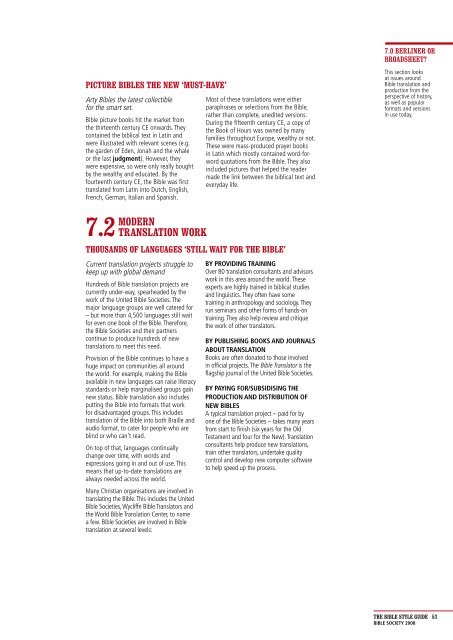BiBle STyle Guide - Get a Free Blog
BiBle STyle Guide - Get a Free Blog
BiBle STyle Guide - Get a Free Blog
Create successful ePaper yourself
Turn your PDF publications into a flip-book with our unique Google optimized e-Paper software.
pictUre <strong>BiBle</strong>s the new ‘mUst-have’<br />
Arty Bibles the latest collectible<br />
for the smart set.<br />
Bible picture books hit the market from<br />
the thirteenth century CE onwards. They<br />
contained the biblical text in Latin and<br />
were illustrated with relevant scenes (e.g.<br />
the garden of Eden, Jonah and the whale<br />
or the last judgment). However, they<br />
were expensive, so were only really bought<br />
by the wealthy and educated. By the<br />
fourteenth century CE, the Bible was first<br />
translated from Latin into Dutch, English,<br />
French, German, Italian and Spanish.<br />
7.2 modern<br />
translation work<br />
Current translation projects struggle to<br />
keep up with global demand<br />
Hundreds of Bible translation projects are<br />
currently under-way, spearheaded by the<br />
work of the United Bible Societies. The<br />
major language groups are well catered for<br />
– but more than 4,500 languages still wait<br />
for even one book of the Bible. Therefore,<br />
the Bible Societies and their partners<br />
continue to produce hundreds of new<br />
translations to meet this need.<br />
Provision of the Bible continues to have a<br />
huge impact on communities all around<br />
the world. For example, making the Bible<br />
available in new languages can raise literacy<br />
standards or help marginalised groups gain<br />
new status. Bible translation also includes<br />
putting the Bible into formats that work<br />
for disadvantaged groups. This includes<br />
translation of the Bible into both Braille and<br />
audio format, to cater for people who are<br />
blind or who can’t read.<br />
On top of that, languages continually<br />
change over time, with words and<br />
expressions going in and out of use. This<br />
means that up-to-date translations are<br />
always needed across the world.<br />
Many Christian organisations are involved in<br />
translating the Bible. This includes the United<br />
Bible Societies, Wycliffe Bible Translators and<br />
the World Bible Translation Center, to name<br />
a few. Bible Societies are involved in Bible<br />
translation at several levels:<br />
Most of these translations were either<br />
paraphrases or selections from the Bible,<br />
rather than complete, unedited versions.<br />
During the fifteenth century CE, a copy of<br />
the Book of Hours was owned by many<br />
families throughout Europe, wealthy or not.<br />
These were mass-produced prayer books<br />
in Latin which mostly contained word-forword<br />
quotations from the Bible. They also<br />
included pictures that helped the reader<br />
made the link between the biblical text and<br />
everyday life.<br />
thoUsands of langUages ‘still wait for the <strong>BiBle</strong>’<br />
by PRoViDiNG tRAiNiNG<br />
Over 80 translation consultants and advisors<br />
work in this area around the world. These<br />
experts are highly trained in biblical studies<br />
and linguistics. They often have some<br />
training in anthropology and sociology. They<br />
run seminars and other forms of hands-on<br />
training. They also help review and critique<br />
the work of other translators.<br />
by PublisHiNG booKs AND JouRNAls<br />
About tRANslAtioN<br />
Books are often donated to those involved<br />
in official projects. The Bible Translator is the<br />
flagship journal of the United Bible Societies.<br />
by PAyiNG FoR/subsiDisiNG tHe<br />
PRoDuctioN AND DistRibutioN oF<br />
NeW bibles<br />
A typical translation project – paid for by<br />
one of the Bible Societies – takes many years<br />
from start to finish (six years for the Old<br />
Testament and four for the New). Translation<br />
consultants help produce new translations,<br />
train other translators, undertake quality<br />
control and develop new computer software<br />
to help speed up the process.<br />
7.0 Berliner or<br />
BroAdSheeT?<br />
This section looks<br />
at issues around<br />
Bible translation and<br />
production from the<br />
perspective of history,<br />
as well as popular<br />
formats and versions<br />
in use today.<br />
The <strong>BiBle</strong> <strong>STyle</strong> <strong>Guide</strong> 53<br />
bible society 2008


